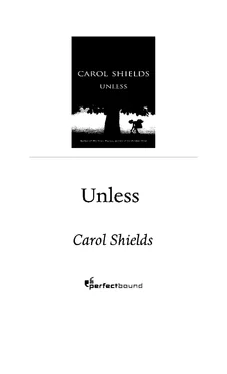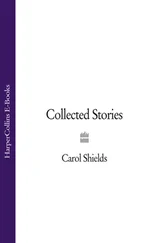Carol Shields - Unless
Здесь есть возможность читать онлайн «Carol Shields - Unless» — ознакомительный отрывок электронной книги совершенно бесплатно, а после прочтения отрывка купить полную версию. В некоторых случаях можно слушать аудио, скачать через торрент в формате fb2 и присутствует краткое содержание. Жанр: Современная проза, на английском языке. Описание произведения, (предисловие) а так же отзывы посетителей доступны на портале библиотеки ЛибКат.
- Название:Unless
- Автор:
- Жанр:
- Год:неизвестен
- ISBN:нет данных
- Рейтинг книги:4 / 5. Голосов: 1
-
Избранное:Добавить в избранное
- Отзывы:
-
Ваша оценка:
- 80
- 1
- 2
- 3
- 4
- 5
Unless: краткое содержание, описание и аннотация
Предлагаем к чтению аннотацию, описание, краткое содержание или предисловие (зависит от того, что написал сам автор книги «Unless»). Если вы не нашли необходимую информацию о книге — напишите в комментариях, мы постараемся отыскать её.
Unless — читать онлайн ознакомительный отрывок
Ниже представлен текст книги, разбитый по страницам. Система сохранения места последней прочитанной страницы, позволяет с удобством читать онлайн бесплатно книгу «Unless», без необходимости каждый раз заново искать на чём Вы остановились. Поставьте закладку, и сможете в любой момент перейти на страницу, на которой закончили чтение.
Интервал:
Закладка:
“I printed it out this morning. This is it, or rather, most of it.”
“Let me see. Hmm. The heft itself is most impressive — three hundred pages — oh my, Reta, you’ve added quite a bit since I read it in December. Quite a bit.”
“I still have a hundred things to do. Some patching and poking. And the final chapter.”
“Ah yes, the final chapter. The all-important final chapter.”
“The most difficult chapter in a way.”
“I absolutely agree. It’s critical. What is a novelist to do? Provide closure for the reader?
Or open the narrative to the ether?”
“You mean —”
“I think of the final chapter as the kiln. You’ve made the pot, Reta, the clay is still malleable, but the ending will harden your words into something enduring and beautiful. Or else beautiful and ethereal.”
“What an interesting thought. I was just thinking the other day about the way a bronze casting sometimes breaks unexpectedly in the forge. And now you mention pots in the kiln —
”
“I meant it as a metaphor.”
“So did I.”
“I knew we were kindred spirits, Reta. Though I should tell you I am in favour, in your particular case, of not offering closure. There is a danger, you see, that you might trivialize Roman’s search for identity, which is ongoing, a forever kind of thing.”
“Can I give you a little more wine?”
“With pleasure. Lovely and dry, this red, just the thing for our first face-to-face meeting.
The sort of meeting that could be difficult.”
“I do want you to know, Mr. Springer, that I am completely open to editing suggestions.”
“Arthur, please. That’s wonderful to know, that you don’t object to the editorial hand. I understand Mr. Scribano did not really edit My Thyme Is Up. He was the editor, of course, nominally, but he did very little, my sources tell me, in the way of reshaping the work.”
“He did ask me to break one very long paragraph into two, and I thought that was an excellent suggestion. I was happy to —”
“I believe I told you on the phone that I like to have a much more hands-on approach with my authors. For their sake. And for Scribano & Lawrence. What we both want, editor as well as writer, is the very best book possible, wouldn’t you agree, Reta? Have you read Darling Buds ? For me that book, which I am proud to have worked on, is an example of a comic novel that never for a moment loses its investment of concern with its central image.”
“Which is —?”
“Which is the pursuit of identity. I-den-ti-ty.”
“Identity can be —”
“Identity is the dominant mystery of our lives, the numinous matter of self, and it can’t help but surrender to its own ironic destiny. Which is this: the self can never be known. This is the calamity of our lives, simply that, which is why Darling Buds is such a profound statement of being. As a book it is un succès d’estime, I admit. That’s a French expression. It means it —”
“Yes, I know.”
“Not a bestseller, true. A nation of TV gluttons doesn’t want to take art seriously, not while fast-food fare is available. But I am serious, Reta. I want you to know that I, your editor, care deeply about literature and its paramount statement. And I believe you do, too. In fact, I know you do.”
“Perhaps you will let me refill that glass.”
“A splendid wine. You see — let me explain — I’ll lay it out for you. Scribano & Lawrence — and I am happy to make this statement — we don’t need to publish megabuck books.”
“But surely you have to keep an eye on a book’s marketability and the readers who —”
“We happen to be in a very nice position at the moment. You’ve heard of John Lord Morgan? And Wilfred Laranzo?”
“Vaguely, but I haven’t actually —”
“They’re both ours. Morgan writes courtroom drama. Laranzo does interplanetary fantasy.
We’re glad to have them on our list. They make huge bucks, bucks enough to keep the rest of our writers viable. Our serious literary writers. Our gilt-edged writers.”
“You’re saying that —”
“I’m saying, Reta, that we’re in the market for quality fiction.”
“As opposed to —”
“As opposed to popular fiction.”
“Oh.”
“We want to publish your manuscript. We stand ready to do that. I don’t want to confuse you on that point —”
“But —”
“But you must realize that Thyme in Bloom could be one of those signal books of our time.
The possibility is there. Your manuscript could become a monument. Everything is in place, and with a mere two or three shifts of perspective you could move from a popular novel to a work of art.”
“Gilt-edged.”
“Right. I knew you’d key right in. You’re an intelligent woman, after all, and this manuscript is so close to greatness that it would be a tragedy not to turn it around. We have that chance, Reta. That’s why I’ve come all the way up here to the north. To tell you that your new novel is not in the same company as your first book. My Thyme Is Up was a completely other enterprise.”
“It did win the Offenden Prize.”
“Exactly.”
“But the new book is a sequel to that book.”
“That’s the first thing we can turn around. Maybe I will have a little more wine. Hmm, beautiful. Did you know that a sequel, on average, only makes two-thirds the money that the original has earned?”
“But I thought you said money wasn’t an issue —”
“It’s not. And you did very well with your first novel. Not millions, to be sure, but what we call a very decent run. And the paperback did fairly well too. But your current work is of a different magnitude altogether. This manuscript, these pages before us, are about the central moral position of the contemporary world. I think it is exceptionally important that we not present this with the title you have suggested, Thyme in Bloom. Personally, I prefer Bloom on its own.”
“Just — Bloom ?”
“What a word that is. Suggestive but not literal. And you can see how it gestures toward the Bloom of Ulysses, Leopold Bloom, that great Everyman.”
“But my name is associated with —”
“Associated with light fiction. This is why, in my thinking over the last two weeks, I’ve come to favour a pseudonym. The problem is to find the right one. Now what was your name before you married, Reta? And do you have a middle name?”
“Reta Ruth Summers.”
“Wonderful, I love Summers. It fits perfectly with Bloom, doesn’t it? Bloomsday, et cetera. The month of June. There’s a kind of preternatural blood hyphen there, if we can just pin it down. We, Scribano & Lawrence, could present you as R. R. Summers. I like it. It sounds solid. Yet fresh. A new writer, a new discovery: R. R. Summers.”
“Using initials, though, might make it sound like, you know, that I’m a male writer.”
“Does it matter? You’re dealing with universal themes. You’ve gone beyond the gendered world.”
“But this book — well, Alicia is thinking quite hard about gender, at least in her own rather spacey way.”
“Spacey, hmm. That’s true, that’s absolutely true, but even at this stage we can put a kind of torque on the book and move it toward the universal. I have a number of ideas that I want to put before you, Reta. The first is —”
“You make it sound as though we’ll be rewriting the whole book.”
“Just tweaking, that’s all. Everything is here, Reta. Everything is beautifully here.”
“I had thought — I’ve been thinking that the book was — almost done. I was going to write the concluding scene after —”
Читать дальшеИнтервал:
Закладка:
Похожие книги на «Unless»
Представляем Вашему вниманию похожие книги на «Unless» списком для выбора. Мы отобрали схожую по названию и смыслу литературу в надежде предоставить читателям больше вариантов отыскать новые, интересные, ещё непрочитанные произведения.
Обсуждение, отзывы о книге «Unless» и просто собственные мнения читателей. Оставьте ваши комментарии, напишите, что Вы думаете о произведении, его смысле или главных героях. Укажите что конкретно понравилось, а что нет, и почему Вы так считаете.












